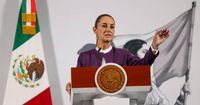The global frenzy ignited by President Donald Trump's announcement of reciprocal tariffs continues to resonate across various sectors. On April 2, 2025, the United States Trade Representative (USTR) released a note attempting to justify the tariffs imposed on different countries. This note claimed that the numbers were derived from a mathematical formula that, upon scrutiny, was quickly discredited due to its reliance on generalized economic assumptions and the misinterpretation of academic articles. The backlash was swift, as analysts and economists pointed out the flaws in the calculations, which were perceived as an attempt to fabricate a narrative of fairness and generosity from the Trump administration.
During the tumultuous stock market sessions that followed, Trump's economic advisors, including Commerce Secretary Howard Lutnick and special advisor Peter Navarro, scrambled to reshape the narrative surrounding the tariffs. They painted a picture of a bright new world where the tariffs would lead to more jobs, better wages, increased investment, and enhanced product quality. However, experts caution that it is too early to measure the long-term destructive effects of these tariffs, which are expected to create an atmosphere of uncertainty and distort investment decisions.
President Claudia Sheinbaum of Mexico has voiced concerns regarding the potential repercussions of these tariffs on her country's economy. She emphasized that her government is currently engaged in discussions with the White House to reach a prior agreement that could stave off the imposition of reciprocal tariffs. Such tariffs, particularly on steel and aluminum, could lead to significant price increases in Mexico, which Sheinbaum aims to avoid.
Sheinbaum's administration has maintained that dialogue is preferable to immediate retaliation through tariffs. "We want to avoid imposing reciprocal tariffs as much as possible," she stated, highlighting the potential economic fallout from such measures. Economy Secretary Marcelo Ebrard is set to travel to Washington this week to further these discussions.
In contrast, other nations have responded more aggressively to Trump's tariff announcements. China, for instance, has implemented a 34 percent tariff on U.S. imports in retaliation, prompting Trump to threaten an additional 50 percent tariff if China does not withdraw its own tariffs on American products. The European Union is also considering a 25 percent tariff on select U.S. goods as a countermeasure.
The announcement of these tariffs has sparked a trade war, resulting in notable losses in the stock markets. According to Valmex, a financial services firm, Trump's new tariffs were more severe than anticipated, with economic consequences likely to include higher inflation and a slowdown in growth.
Javier Guzmán Calafell, an economist, expressed deep concerns over the implications of Trump's tariffs for Mexico. He noted that while Mexico and Canada may have been less affected than other nations, the long-term effects of U.S. trade policy could be detrimental. Guzmán pointed out that tariffs on the automotive industry, steel, and aluminum place Mexico in a worse position than just a few months ago. He also raised doubts about the viability of the United States-Mexico-Canada Agreement (USMCA), suggesting it may become more restrictive during future renegotiations.
The global economy is already reeling from the impacts of the pandemic and the war in Ukraine, and Guzmán warned that the new tariffs could plunge it into a recession. The potential slowdown of the U.S. economy is particularly concerning for Mexico, which has already begun to experience economic contraction.
As the Mexican government navigates these turbulent waters, it is also grappling with its own internal challenges. The country faces fragile public finances and modest growth potential. Recent projections from the Secretaría de Hacienda y Crédito Público (SHCP) indicate a fiscal deficit reduction to 3.9-4% of GDP in 2025, but many analysts are skeptical about these optimistic forecasts.
Some experts predict that economic growth in Mexico will be stunted, with estimates as low as 0.5% for 2025. This projection raises significant concerns regarding the sustainability of public finances, especially in light of Pemex's ongoing financial struggles and rigid public spending.
In response to these challenges, the Mexican government has initiated the "Plan Mexico," which includes 18 programs aimed at bolstering the economy. However, Guzmán criticized these measures as insufficient, arguing that more aggressive actions are required to boost productivity, stimulate private investment, and strengthen the workforce, particularly among women.
Despite the challenges posed by U.S. protectionism, Guzmán believes that Mexico must seize the opportunities that arise from the shifting global landscape. He cautioned, however, that without a substantial change in public policy, the chances of overcoming the current economic difficulties are slim.
As the situation continues to unfold, the Mexican government remains committed to negotiating better terms with the U.S. and strengthening its internal economy. The outcome of these discussions will be crucial in determining how Mexico navigates the complex challenges posed by Trump's tariffs and the broader trade war.






